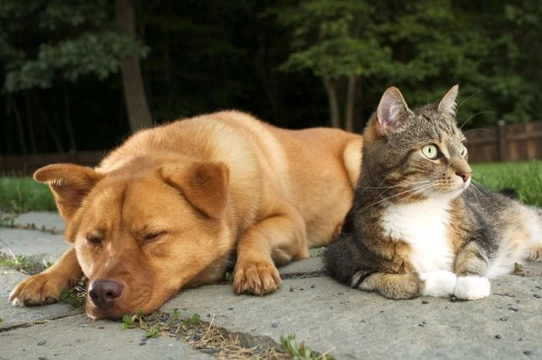
Calming aids for cats and dogs
If your cat or dog is highly strung, prone to stress or suffering from behavioural problems, don't despair. There are several things you can do in order to help calm them down, reduce the effects of stress, and keep them on an even keel.
Feeding and food additives
There are several specialist cat and dog foods on the market today aimed at minimising possible stress related problems in dogs and cats. Royal Canin supplies one.
Royal Canin Calm CD 25 for dogs provides essential nutritional support for dogs which suffer from stress related skin and digestive disorders. Royal Canin Feline Calm is a supportive diet for cats undergoing stress related behavioural therapy, and is tailored for the nutritional support of cats with skin, digestive and urinary disorders caused by anxiety and stress.
Both of these specialist veterinary diets are designed as palliative support to specialist advice and treatment in helping address the root causes of stress and behavioural problems. They should be used in conjunction with behavioural treatment and management.
There are also various supplements such as 'MagiCalm' which you can buy to add to your cat or dog's food in order to soothe your pet and promote a sense of wellbeing.
Your veterinary surgeon or pet behaviour specialist may recommend other tailored diets or food additives for your specific pet - ask them for advice.
Feliway and DAP
DAP or 'Dog Appeasing Pheromone' for dogs is available as a spray, room diffuser or impregnated collar. Composed of a synthetic pheromone compound designed to mimic the 'feel good' hormone produced by nursing bitches, DAP is recommended for dogs who suffer from general anxiety, separation anxiety and fear of bangs and loud noises. It can also help to calm highly strung dogs.
Feliway (for cats) is a natural compound developed to mimic the 'feel good' pheromones which cats use to mark their territory and communicate with other cats. Available as either a spray or an in- room diffuser, Feliway has no discernable scent to people. Using one or more Feliway diffusers in the home or spraying areas with the bottled version can go a long way to keeping your cat calm and relaxed, and helping them feel safe in their home environment.
There is also a compound called 'Felifriend' available as a small spray bottle, designed specifically to ease the stress of caging and transporting your cat, or for use when introducing new cats to each other.
Both DAP and Feliway can be bought in a variety or outlets or online, and most veterinary surgeries sell and recommend the product range.
Catnip
Catnip is a natural herb that can be grown at home or bought pre packaged. Available dried, as a spray and in many other formats including a herbal remedy by capsule, it is commonly used in the manufacture of cat toys, and has a mildly euphoric effect on most cats.
While not all cats are affected by catnip and young kittens do not become susceptible to it until they get older, the majority of cats enjoy eating, inhaling and playing in catnip and catnip laced products. It can also be highly entertaining to watch your cats enjoying the 'natural buzz' provided by catnip too!
Rescue Remedy
Bach's Rescue Remedy contains a combination of naturally calming herbs and flowers, and is sold as a suspension in water for easing shock, stress and anxiety. You may already be familiar with Rescue Remedy, as it is a popular home remedy for people too!
Rescue Remedy is safe for use on dogs and cats, and has no known side effects. If your pet is on any other medication or undergoing a course of veterinary treatment, it is always best to check with your vet before introducing any other products in case of possible ingredient interactions.
In order to treat dogs and cats with Rescue Remedy, add four drops of the concentrated solution to 30ml of water, and either add to their food or drinking water, or administer small doses directly to the pet.
You can also administer your Rescue Remedy solution by rubbing a little bit of the diluted mixture onto the inner flaps of your pet's ears, where it is absorbed into the skin and inhaled. Never pour water or any other solution into your pet's ears, and do not use so much that their ears or fur becomes wet.
Behavioural therapy
Try and identify the source or root cause of anything that may be stressing or upsetting your pet. Do you need to look at their interaction with any other animals in the household, and consider making some changes, such as having set territories for your pets, or rethinking how and where they are fed?
Are other animals coming into the garden a source of stress for your pet, and what can you do to try and minimise this?
If there is no obvious root cause of the problem or a quick fix available, you may want to consider speaking to your vet about what else you can do. Your vet may recommend working with a professional cat or dog behavioural therapist. These specialist experts are experienced in reading the clues and signs within your pet's behaviour and identifying the root causes or reasons for their stress or inappropriate behaviour. They will work with you in retraining your pet or breaking negative reinforcement patterns and changing the environment or your animal's reactions to it in order to keep your pet happy and relaxed.
This kind of specialist advice and support may be rather costly, but the benefits in the long run for both you and your pet make it very worthwhile.



